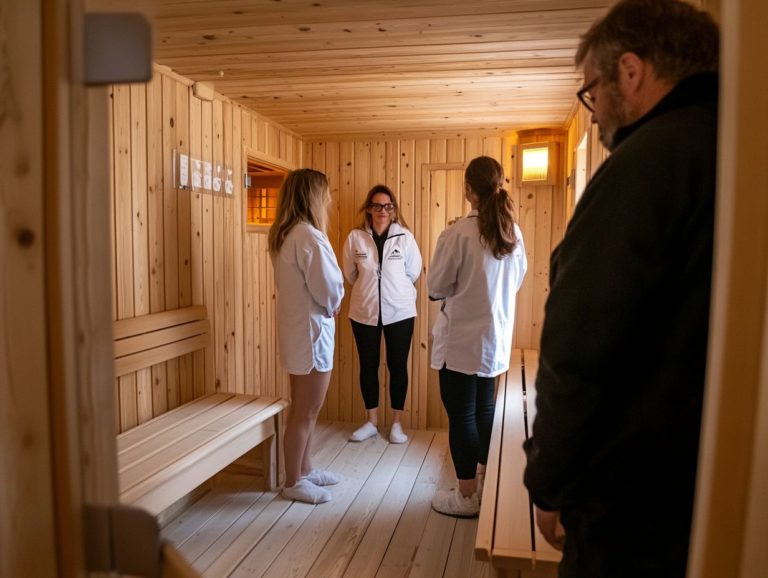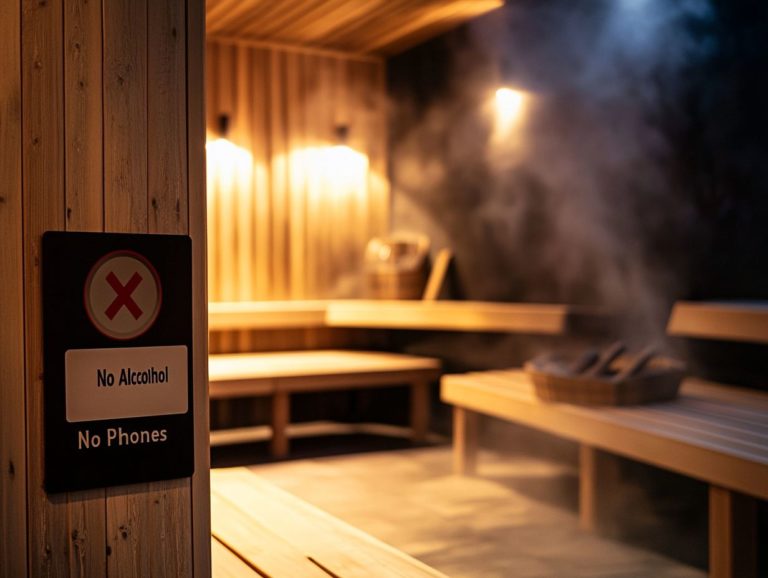The Science Behind the Relaxation Response
In today s fast-paced world, stress has likely become an all-too-familiar companion for you, affecting both your physical and mental well-being. The relaxation response serves as a powerful antidote, offering a pathway to tranquility and healing.
This article delves into the definition and purpose of the relaxation response, examining how your body reacts to stress and the myriad benefits it provides. You ll also find practical techniques, such as meditation and breathing exercises, to seamlessly incorporate this calming state into your daily life.
Embrace the relaxation response and watch your well-being soar!
Contents
- Key Takeaways:
- The Relaxation Response Explained
- The Physiology of the Relaxation Response
- Benefits of the Relaxation Response
- Techniques for Inducing the Relaxation Response
- Incorporating the Relaxation Response into Daily Life
- Frequently Asked Questions
- What is the relaxation response?
- What is the science behind the relaxation response?
- How does the relaxation response affect the body?
- What are some techniques to elicit the relaxation response?
- How does the relaxation response impact mental health and well-being?
- Are there any risks associated with practicing the relaxation response?
Key Takeaways:

- The relaxation response is the body’s natural way of counteracting the harmful effects of stress, promoting a state of calmness and well-being.
- By activating the parasympathetic nervous system, the relaxation response helps reduce blood pressure, heart rate, and muscle tension, improving overall physical and mental health.
- Incorporating relaxation techniques such as meditation and breathing exercises into daily life allows individuals to manage stress and maintain a relaxed state, leading to improved overall well-being.
The Relaxation Response Explained
The Relaxation Response, a term brought to prominence by Dr. Herbert Benson of Harvard Medical School, describes a natural body state achieved through various techniques designed to counteract your body s stress response commonly known as the fight-or-flight response.
This significant concept in mind-body medicine aims to foster deep relaxation, ultimately diminishing the adverse effects of chronic stress on both your physical and mental health, while enhancing your overall well-being. For a deeper insight, explore understanding the neuroscience of relaxation.
The Physiology of the Relaxation Response
Understanding the physiology of the Relaxation Response requires looking into how your body responds to stressors. This response activates a system in your body that helps manage stress, leading to the release of hormones such as cortisol and epinephrine.
Understanding this interplay now can change how you handle stress and highlights the importance of fostering a state of relaxation.
How the Body Responds to Stress
When you encounter stress, your body engages in a sophisticated stress response, releasing cortisol and epinephrine. This prepares you for immediate physical action but can lead to chronic stress if not managed properly.
Cortisol, often dubbed the stress hormone, plays a pivotal role in regulating various bodily functions, including blood sugar levels and metabolism. Meanwhile, epinephrine, or adrenaline, triggers your fight-or-flight response, boosting blood flow to critical muscles and elevating your heart rate.
While these hormones are essential for short-term survival and handling acute stress, prolonged exposure due to ongoing stressors can undermine your immune system, disrupt your sleep patterns, and contribute to anxiety and depression. Understanding these physiological factors and their effects underscores the necessity of stress management for your overall health and well-being.
The Role of the Autonomic Nervous System

The autonomic nervous system plays a key role in regulating the Relaxation Response, elegantly balancing the fight-or-flight instinct with techniques that usher in calm and restoration.
This intricate network of nerves operates mostly without your conscious input, managing vital functions like heart rate, digestion, and respiratory rate. By facilitating smooth transitions from high-stress scenarios to serene states, it allows you to effectively recover from daily pressures. Additionally, understanding the science behind sauna use can further enhance your recovery process.
Techniques such as deep breathing, meditation, and progressive muscle relaxation tap into this powerful system, guiding you from sympathetic dominance when your body is in alert mode to parasympathetic activation, which fosters a profound sense of safety and rejuvenation.
Grasping these dynamics equips you to weave relaxation practices into your daily routine, significantly elevating your overall well-being.
In conclusion, understanding the relaxation response can change how you approach stress and improve your overall health. Start integrating these practices today!
Benefits of the Relaxation Response
The Relaxation Response offers numerous benefits that can greatly enhance your physical and mental health. By engaging in this practice, you can reduce the risk of cardiovascular disease, alleviate anxiety disorders, and promote an overall sense of well-being.
Physical and Mental Health Benefits
The benefits of the Relaxation Response are truly remarkable. It can help lower blood pressure and reduce symptoms of anxiety disorders. This approach provides a complete way to take care of your health.
This method alleviates high blood pressure, which is a common issue for many people. It also serves as a powerful tool for managing stress-related issues that can disrupt your daily life. By fostering a state of deep relaxation, the Relaxation Response encourages your body to restore balance. For a deeper understanding of how this works, explore the science behind relaxation techniques. This leads to improved cardiovascular health and enhanced emotional resilience.
Consistent practice will help you feel relief from anxiety and tension, ultimately promoting a harmonious connection between your body and mind.
Techniques for Inducing the Relaxation Response
Discover exciting techniques to induce the Relaxation Response, including deep relaxation methods like meditation, focused breathing, muscle relaxation, and visualization.
These approaches engage both your mind and body, guiding you toward a state of tranquility while highlighting the science of relaxation and how it affects your body.
Meditation, Breathing Exercises, and More

Meditation, breathing exercises, and practices like qi gong, tai chi, and yoga are all excellent methods for inducing the Relaxation Response. Each provides unique advantages for your mind and body.
These practices not only foster a tranquil mental state but also enhance your physical well-being by alleviating stress and anxiety. Meditation encourages mindfulness and self-awareness, while breathing exercises focus on breath regulation to align your body’s physiological responses. Understanding the importance of relaxation is essential for overall wellness.
Practices like qi gong and tai chi include gentle movements and postures that promote energy flow, offering a dynamic route to relaxation. These techniques empower you to engage in deeper self-care, facilitating a holistic transformation that nurtures inner peace and strengthens your resilience against daily stress. Additionally, exploring the science behind sauna-induced relaxation can further enhance your relaxation journey.
Incorporating the Relaxation Response into Daily Life
Incorporating the Relaxation Response into your daily routine is essential for mastering stress management. By doing so, you will navigate life’s challenges with increased ease and resilience, transforming your approach to both the mundane and the extraordinary.
Tips for Maintaining a Relaxed State
To maintain relaxation, embrace various techniques like mindfulness meditation, deep relaxation practices, and regular exercise. Each significantly enhances your overall well-being.
Incorporating these practices into your daily routine can drastically improve your stress management skills. Just a few minutes of mindfulness meditation each day helps cultivate awareness and calmness, making it easier to tackle challenges. Similarly, deep breathing exercises during short breaks can effectively reduce tension.
Consistent physical activity, whether through yoga or a brisk walk, not only boosts your mood but also builds resilience. By establishing a regular schedule around these techniques, you reinforce your body’s natural relaxation response, creating an effective antidote to a busy lifestyle.
Frequently Asked Questions
We encourage you to explore these techniques and share your experiences with the Relaxation Response. You might discover immediate benefits that can improve your daily life!
What is the relaxation response?

The relaxation response is a calm state of the body that counters the stress-induced fight or flight response. It leads to a decrease in heart rate, blood pressure, and muscle tension.
What is the science behind the relaxation response?
Dr. Herbert Benson discovered the relaxation response in the 1970s. This principle shows that our bodies can heal and restore themselves through simple relaxation techniques.
How does the relaxation response affect the body?
This response offers many benefits. It reduces stress and anxiety, improves digestion and sleep, and boosts the immune system.
What are some techniques to elicit the relaxation response?
You can practice techniques like deep breathing, progressive muscle relaxation, meditation, and yoga. Try them individually or combine them for better results.
How does the relaxation response impact mental health and well-being?
The relaxation response greatly benefits mental health. It helps alleviate symptoms of depression, anxiety, and PTSD while enhancing overall resilience.
Are there any risks associated with practicing the relaxation response?
Relaxation techniques are generally safe for people of all ages. Still, consult a healthcare professional if you have underlying conditions, like heart disease or high blood pressure.






